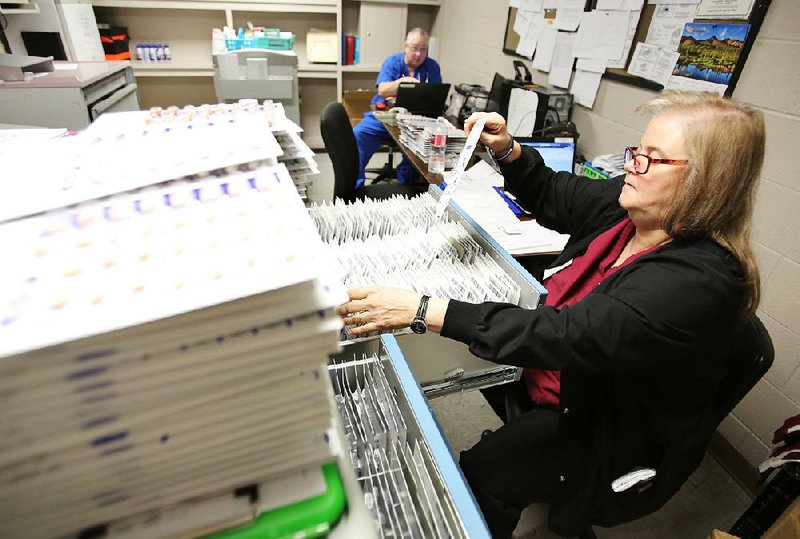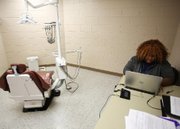Privatized health care service in county jails has become an enticing option to many sheriffs across the state, some of whom feel outmatched by the expensive and complex responsibility of inmate health care.
In January, Turn Key Health Clinics LLC took over health care operations in the Saline County jail. It was the sixth jail contract the company has signed in Arkansas after moving into Pulaski County’s jail a month before.
The for-profit company is one of several in the state to promise jail administrators improved quality of care at a lower cost.
At the Pulaski County jail, the company’s $3.7 million annual contract replaced the jail’s previous $4.45 million medical budget, saving the county $750,000 annually. Turn Key has doubled the number of hours physicians spend on site from 24 to 48, increased the number of full-time health employees from 19 to 36 and implemented the use of electronic health records.
Turn Key co-founder and Director Jon Echols said his sales pitch to county sheriffs is simple: You run the jail and leave medical care to us.
“We specialize in how to run health care,” Echols said. “I couldn’t do the sheriff’s job. I don’t know how to run a jail; I’d fail miserably. But we’re really good at health care.
“Our model is simple: We increase coverage,” he said.
Turn Key’s model has led to about a 70 percent decrease in the number of medical-related grievances filed by inmates so far this year, down to 198 from 641 this time last year. As in most county jails, inmates are always free to file grievance forms if they feel they’re not getting proper medical attention or timely treatment.
On May 19, for instance, Pulaski County inmate Steven Voegele claimed that he was administered the wrong insulin when a nurse “didn’t follow proper protocol by not showing me the label and bottle as required,” he wrote in a grievance form. “As a result I was … sent into diabetic shock.”
And in December 2016, Saline County inmate Clifford Yarberry wrote in a grievance form, “I have been told that I would see a provider but have not. I am in a great deal of pain and have only been neglected.”
The types of complaints vocalized by Yarberry and Voegele are taken seriously, jail officials said, but often complaints are baseless and stem from inmates’ unmet requests for services that would violate jail rules, such as requests for prescription narcotics.
“When you’re dealing in health care, you have claims one way or another. That’s part of the deal,” Echols said. “If there’s an issue, then let’s fix it right away. But if there’s not an issue and I have to spend $20,000 in legal fees defending it, it’s crushing. Those costs get passed right on to taxpayers.”
Inmate health care became a constitutional requirement after a 1976 case in which a Texas inmate accused a prison of inflicting cruel and unusual punishment by not providing adequate treatment for a back injury. That case, Estelle v. Gamble, led the Supreme Court to rule that governments must supply adequate treatment to inmates in jails and prisons, and that “unnecessary suffering is inconsistent with contemporary standards of decency.”
Since that decision, inmates can file complaints against sheriffs and jailers if they believe the health care they are receiving is unconstitutional. If an inmate feels a grievance isn’t being addressed, he can file what is known as a 1983 Complaint Form — named after Section 1983 of the Civil Rights Act — to trigger a civil-rights lawsuit in federal court.
Inmates don’t hesitate to take such action, officials said. No matter the quality of care they are given, any health care service — delivered through a private provider or county government — will yield a number of inmate lawsuits as a matter of course, Echols said.
Part of Turn Key’s promise to its clients is that with improved quality of care, the number of health care-related suits filed by inmates will decrease.
A large majority of such cases ultimately end in dismissal, officials said, but a few end in settlement.
In 2012, for instance, a lawsuit filed by seven women accused Pulaski County jail employees of failing to provide proper medical treatment while they were pregnant and incarcerated. One of those plaintiffs, Megan Halferty, said her infant son died because of a lack of prenatal care.
That lawsuit was settled, and the sheriff’s office paid nearly $180,000 split among the seven women. The suit also caused jail officials to rewrite health policies relating to pregnant inmates, including the implementation of a prenatal partnership with UAMS Medical Center where doctors can monitor pregnant inmates using telemedicine technology.
A jail fatality case in Saline County, however, had the opposite outcome. Casey Babovec died in 2011 after jail administrators waited several minutes before administering CPR to the man after he fell unconscious.
Babovec was found to have had 0.07 grams of methamphetamine in his system, and he died after several jailers aggressively tried to constrain him, video surveillance shows.
A lawsuit was filed by his family, but they lost the case during a jury trial.
“The jurors are not that sympathetic to this class of citizens. They just aren’t,” said Babovec’s attorney, James Swindoll. “And you can see it in their eyes during the trial.”
About 50 percent of inmates’ medical care in Arkansas’ 70 county jails is contracted out to private companies, such as Turn Key, Advanced Correction Healthcare and Southern Health Partners.
The remaining 50 percent of inmates — mostly in the state’s smaller county jails — are cared for by part-time or full-time nurses and physicians. In some jails, medical workers are county employees. Elsewhere, jails have agreements with individual doctors and nurses, who are on-call and drop in once a week for routine services.
Some attorneys, such as Swindoll, who have filed lawsuits against jails on behalf of inmates, think much more could be done to ensure the inmates are getting quality care.
“We are inundated with inadequate medical and mental health care treatment in jails and prisons in Arkansas,” said Holly Dickson, an attorney for the American Civil Liberties Union of Arkansas. “I think there are plenty of problems with the delivery of medical services, no matter what format they’re doing it — whether it’s a private contract or whether it’s in-house, or a combination of both. It just seems to be a statewide problem.
“It’s very difficult to hold [jails] responsible for these types of issues,” she said.
The primary state entity that ensures standards are being met is Arkansas Jail Standards, a two-person office that cooperates with several governor-appointed regional committees to review each facility on an annual basis.
The standards set out by the state as they relate to health care can’t prevent lapses in adequate coverage, Dickson said.
“The bottom line is that folks aren’t getting the health care they need. It’s just not happening,” she said. “Right now it’s every county for themselves in terms of figuring it out.”
Pulaski and Saline counties, along with other large jails such as Washington County’s, hope to find that answer in private firms like Turn Key.
“We have an obligation to run a constitutional jail, and if you’re talking about lawsuits when you’re not running a medically constitutional jail, you put yourself in a position for a federal court to come in and tell you how to do your job,” Pulaski County Sheriff Doc Holladay said.


